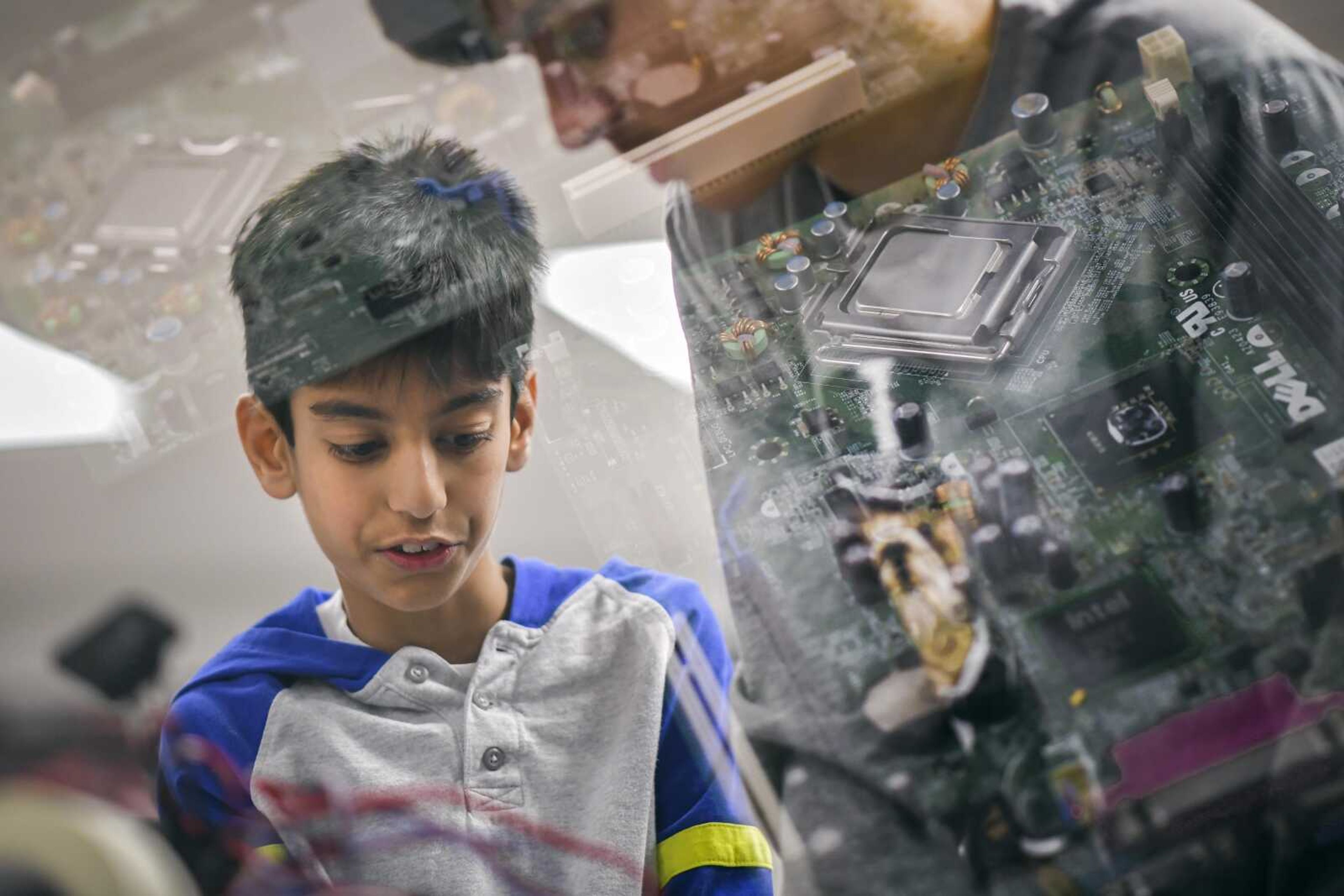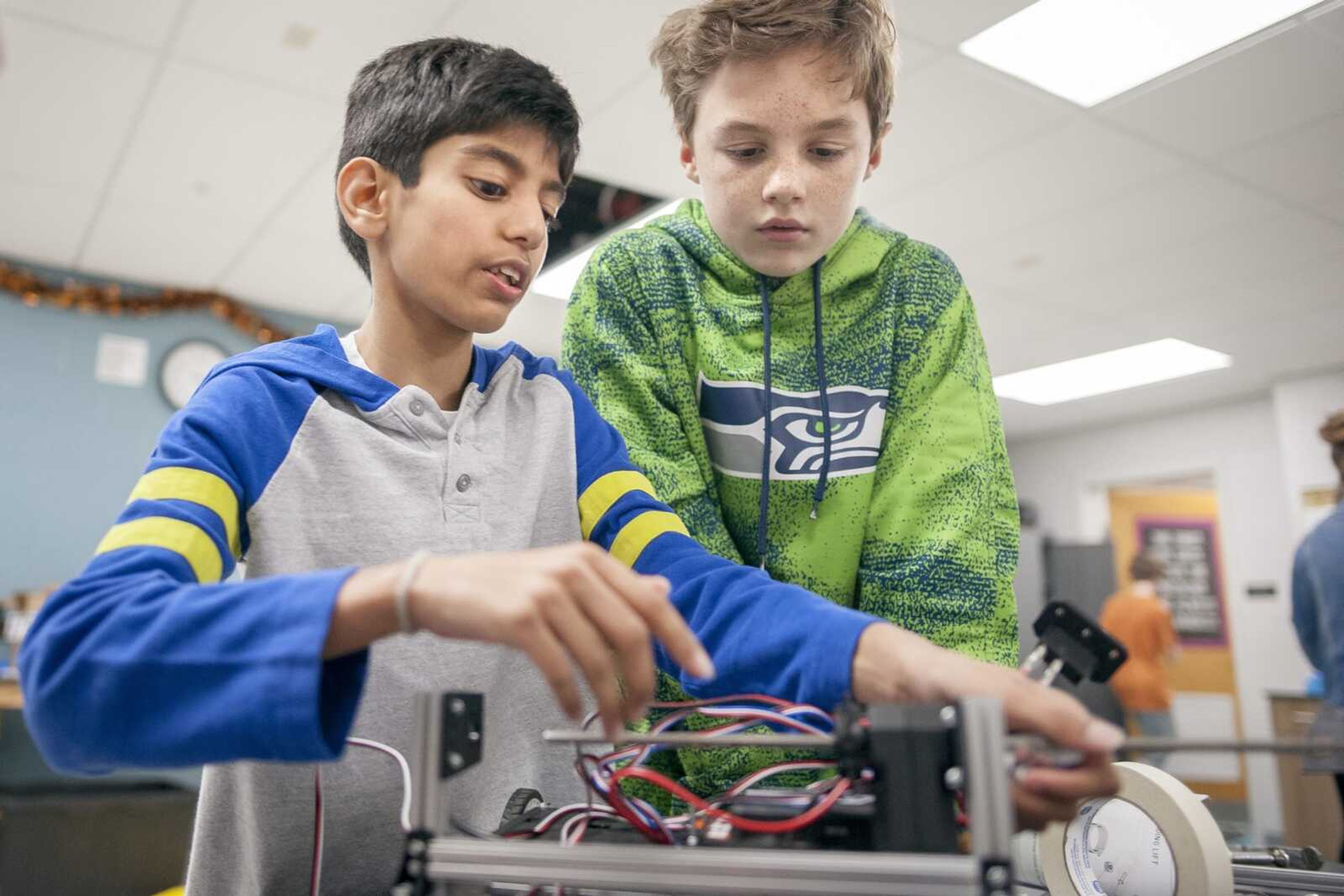In its inaugural year, the Terry W. Kitchen Central Junior High School robotics team is going to state competition in Linn, Missouri.
That’s a pretty major achievement for a group of students who didn’t even start building robots until September, said team coach Julie West.
West is an animated figure. She strides from project to project during the robotics team meeting Tuesday afternoon, asking students questions about what they’re doing and how they got there. Students’ replies are enthusiastic and thorough, complete with demonstrations.
The robots are wheeled frames with motors, sensors, wires and buttons, modular and fully able to scoot across the floor or lift blocks.
Those tasks are important in competitions, West said, but what propelled the team over the edge and helped them qualify for state competition was their ability to realize the plan and the code they’d brought with them wasn’t working, and rebuild it on the fly.

“It was intense,” said Gibson Curtis, team member, who is in eighth grade this year.
West, who is an eighth-grade science teacher and robotics teacher for seventh and eighth grades, also sponsors the robotics club and coaches the robotics competition team.
“The robotics course was sort of birthed out of our knowledge that kids need more of an exposure to engineering and to the problem, solution-based approach in the classroom,” West said. “We’ve just discovered that critical thinking is key. And the more opportunities that kids have to engage that critical thinking and the problem-based learning in the classroom, the better off they’re going to be in the long run.”
First, West said, students get a basic understanding of physics — force motion, torque, rotational power, basic mechanics. Next, students learn how to manipulate the different mechanisms, how to translate lateral motion to rotational motion, for example.
Once those basics are put into practice, West said, “We sit them down and teach them to code.”
The coding language is essentially an abbreviated C++, developed by Carnegie Mellon, West said, called Robot.
“They have to understand exactly what their code is going to do for the robot,” West said. “If they put in the wrong code or don’t configure it properly, of if they don’t set up the right settings on the code, or if they even miss a single punctuation, the robot won’t run.”
Students must learn to be direct and clear when asking questions, West said — and the students need to ask a lot of questions.
“We do a lot of group work,” she said. “It’s not a drudgery. It’s more of an opportunity to come together and learn from one another.”
Students’ strengths can complement one another, West said.
There’s a twist: students don’t have step-by-step instructions. They don’t have diagrams. They have to take individual components, figure out how to use them, then write code that commands the pieces to perform a sequence of tasks.
The students haven’t done all of this work on their own, West said. Several high-school teams have mentored the 16 or so students on the team, which has been helpful, since the team has been competing against high-school teams.
The first competition was in December, West said.
Team member Eric Nordstrom, also in eighth grade, said he was surprised by how much can go wrong in such a short amount of time at a competition.
“You have to think on your feet,” he said, and described an issue where the robot lost power during competition because a block had gotten under the robot and unplugged the battery.
“We’re often the youngest team there,” Nordstrom added.
But that’s been to their advantage, West said.
The upcoming competition in Linn will be teams of a comparable age, so they’ll finally be on a level playing field, she said.
The competition will be held Feb. 29.
Reporter Brooke Holford contributed to this story.
Connect with the Southeast Missourian Newsroom:
For corrections to this story or other insights for the editor, click here. To submit a letter to the editor, click here. To learn about the Southeast Missourian’s AI Policy, click here.








